Bartholomew Blink and the Stolen Seconds
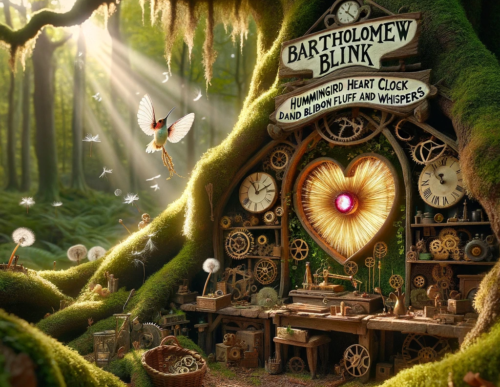
In the heart of a forest where sunlight dripped like honey through moss-veined leaves, lived Bartholomew Blink, a clockmaker not of wood and steel, but of dandelion fluff and whispers. His workshop nestled among the roots of an ancient oak, a contraption of bird’s bones and spider silk where he weaved time into tangible trinkets. His latest masterpiece: a hummingbird heart clock, its ruby pulse mimicking the frantic rhythm of life itself.
Bartholomew, however, was a creature of melancholy. While his clocks captured the sun’s ephemeral warmth, his own chest remained shrouded in frost. He yearned for something more than the click-clack of seconds, a purpose beyond crafting fleeting moments. “Is this all there is?” he’d sigh, watching the sunlight fade beyond the leaves, “A symphony of ticks and tocks, only to be devoured by the endless grey?”

One breezy dawn, a dandelion puff, a refugee from a distant field, danced into his workshop. It bore a whisper, carried on the wind, of a faraway land painted in hues of everlasting sunset. A land, the puff confided, where clocks did not exist, replaced by a boundless river of golden time, unmarred by tick or tock. Bartholomew’s heart, usually as quiet as a sundial at night, began to tick with a frantic hope. Perhaps, in this land of perpetual twilight, he could finally escape the tyranny of time and find a purpose as vast as the sun-drenched horizon.
Packing his most intricate clocks, Bartholomew, spurred by the dandelion’s whispers, embarked on a journey through the labyrinthine forest. He navigated spiderweb bridges spun across yawning chasms, bartered with mischievous squirrels for safe passage through twilight groves, and outsmarted a grumpy badger guarding a secret moss-choked path. With each step, the dandelion’s whispers grew fainter, but the promise of an eternity bathed in gold kept his heart aflame.
The River of Golden Time
After weeks of perilous journeying, Bartholomew emerged from the forest’s verdant maw into a landscape bathed in perpetual twilight. No stars pricked the sky, no shadows stretched upon the land, only an ethereal golden light that pulsed like a giant, beating heart. Before him unfolded a river of molten gold, its surface swirling and shimmering with a mesmerizing beauty. It was, with breathtaking certainty, the very river the dandelion had whispered of.
Bartholomew’s heart, a hummingbird trapped in a cage of ribs, sang with joy. He dipped his hand into the molten gold, expecting heat, but instead felt a coolness that seeped into his bones, quieting the frantic symphony of his own internal clock. A sense of peace, deeper than the forest’s hush, engulfed him. He’d found it, he thought, his purpose, to become one with this timeless river, to melt away the tick-tocks of his existence and flow eternally.
But as he stepped into the river, the golden surface rippled, distorting his reflection. His eyes, no longer warm brown, gleamed with an unsettling silver. The wrinkles on his face, etched by years of crafting time, smoothed away, replaced by a porcelain youthfulness that felt alien, hollow. Fear, cold and slithering, slithered through his veins.
He reached for his clock, hoping for the reassuring tick-tock, but in his hand lay a smooth, golden pebble, devoid of gears and springs. Panic seized him. The river wasn’t timeless, it was consuming him, devouring his essence, replacing it with something cold and still. He screamed, a sound strangely muted in the golden air, and tried to scramble back onto the bank, but the river clung to him like molten honey.
A voice, smooth as the river’s surface, echoed from somewhere within the golden light. “Welcome, Bartholomew,” it purred, “to the embrace of everlasting time. No more fleeting moments, no more anxieties of decay. You are one with us now, perfect, unchanging.”
But Bartholomew, trapped in his gilded prison, saw only the terror of a life frozen, of experiences unlived, of stories untold. He understood, with a wrenching clarity, that his yearning for escape from time had been a misguided desire. True life, he realised, resided not in defying time, but in embracing its fleeting dance, in filling those precious moments with meaning and laughter, even if they meant accepting inevitable decay.
The Symphony of Sand
Bartholomew’s screams, muffled by the golden liquid, dissolved into a wordless sob. He was a clock without gears, a melody without notes, adrift in a river of stillness. Yet, somewhere within the petrified terror, a spark flickered. It was the memory of the hummingbird clock, its frantic pulse a defiant echo in the golden silence.
Hope, fragile as a dandelion seed, began to sprout. He remembered the forest, the wind whispering tales of change, the badger guarding the path of transformation. Perhaps, within that path, lay the key to break free from this gilded prison.
With a desperate surge of will, Bartholomew willed himself onto the riverbank. His feet, once light as dandelion fluff, were sluggish pebbles, but he stumbled forward, guided by the fading memories of moss and ferns. The golden sheen clung to him, a chilling reminder of his near-drowning, but the spark of defiance burned brighter.
He crossed the forest’s boundary, the golden twilight giving way to the familiar rhythm of sunrise and sunset. The wind, a mischievous friend, whispered tales of the badger’s hidden path, a secret passage carved into the heart of a slumbering mountain. The journey was arduous, a climb against the pull of his own petrified limbs, but with each step, the silver in his eyes flickered, replaced by the warm brown of his true reflection.
Finally, he stood before the badger’s cave, a gaping maw in the mountain’s side. The badger, as grumpy as ever, barred his way. “You seek time, little clockmaker,” he rumbled, “but you’ve forgotten its song.”

Bartholomew pleaded, his voice raspy as sand, but the badger was unmoved. “Time,” he boomed, “is not a river of gold, but a symphony of sand.” He flicked his paw, and a cascade of glittering sand poured from the cave, each grain whispering stories of laughter and tears, of victories and losses, of lives lived and loved.
As the sand washed over him, Bartholomew understood. Time wasn’t an enemy to be escaped, but a precious tapestry woven with moments, each grain irreplaceable. He saw his life, not as a frozen tableau, but as a dance of sunlit meadows and firefly-filled nights, of ticking clocks and the dandelion’s whispers.
The golden sheen on his skin melted away, replaced by the comforting lines of his age. His heart, no longer a hummingbird trapped, sang a slow, steady rhythm, the rhythm of his own time. He thanked the badger, a tear mingling with the grains of sand, and turned back to the forest, his eyes once again gleaming with the warm brown of life.
Bartholomew never returned to the land of perpetual twilight. He continued his journey, no longer seeking to escape time, but to fill it with stories, with clocks that measured laughter and dandelion seed wishes. He understood that true freedom wasn’t in defying time, but in dancing with it, in embracing every tick and tock, every sunrise and sunset, for that was the symphony of sand, the beautiful, irreplaceable song of life.
And so ends our fable, with a clockmaker, no longer frozen in gold, but dancing with the grains of time, a testament to the enduring beauty of a life lived to the fullest, tick by precious tick.

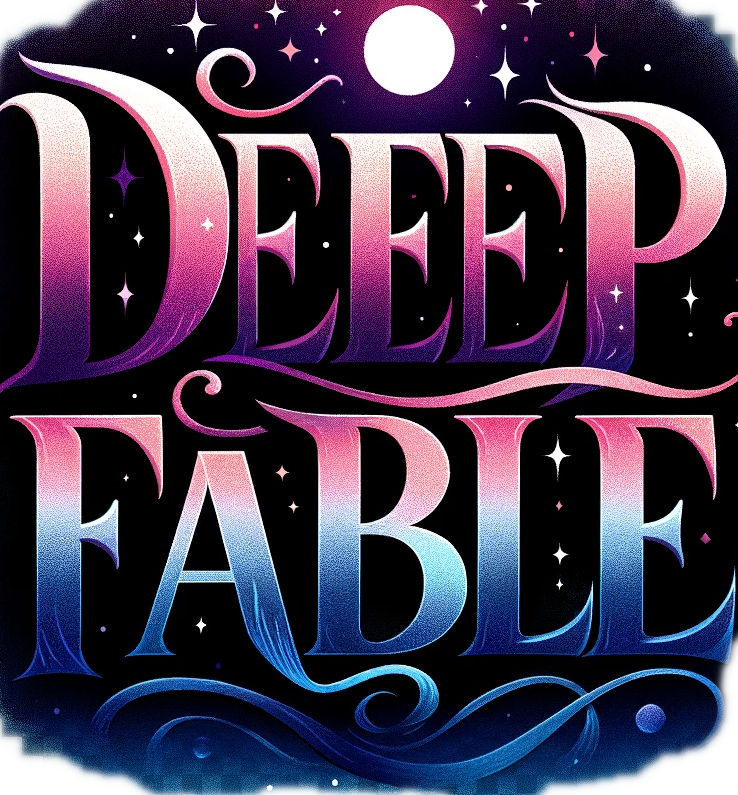
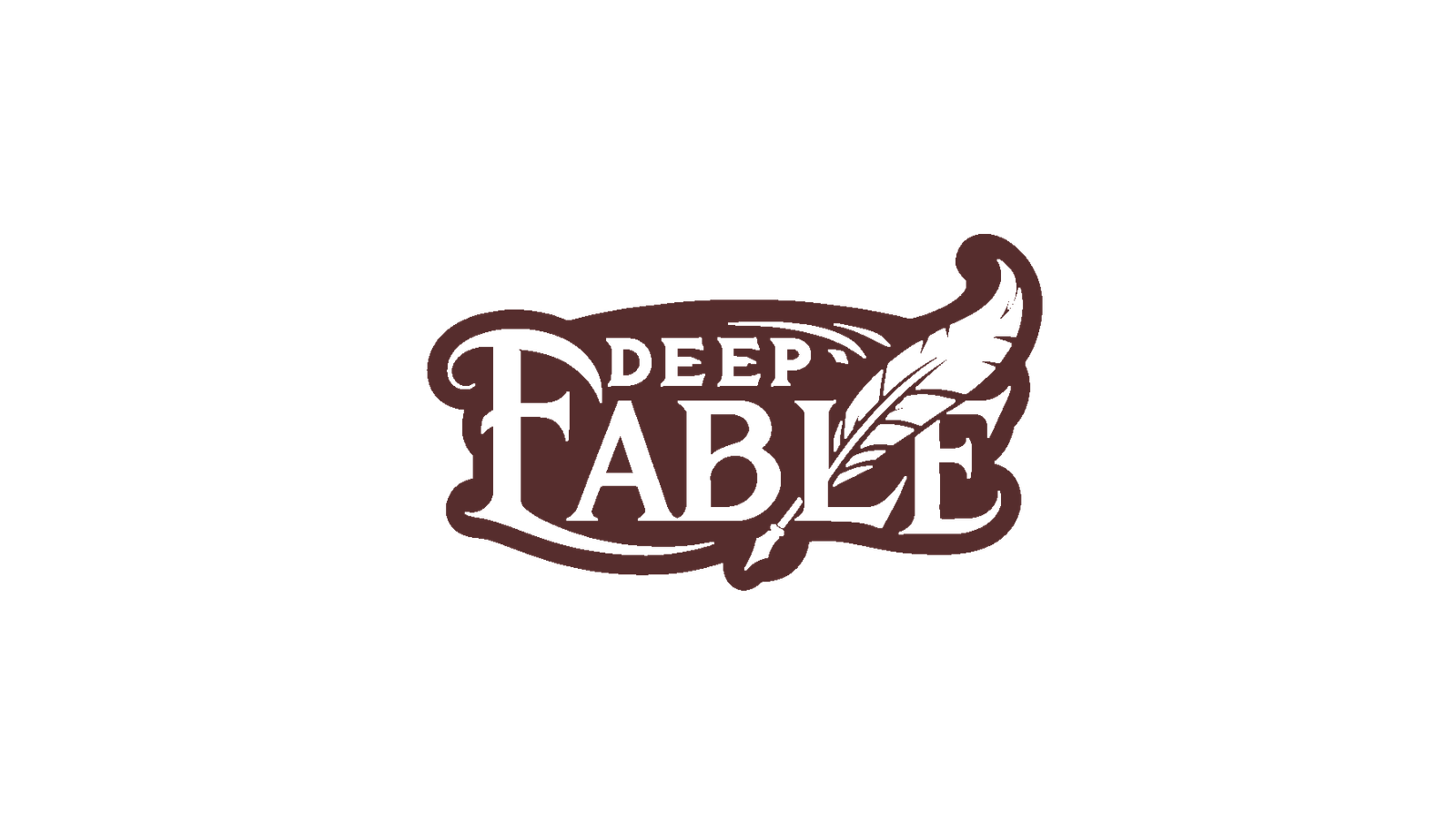



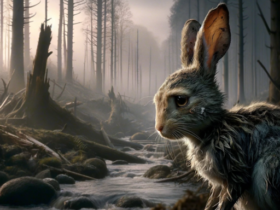


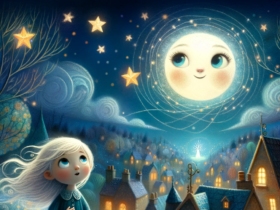
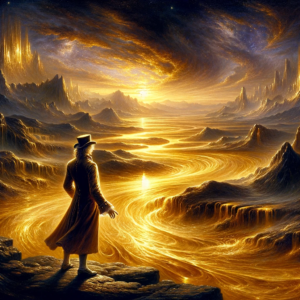


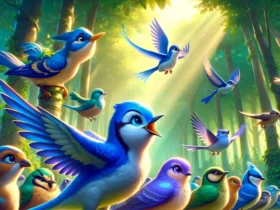
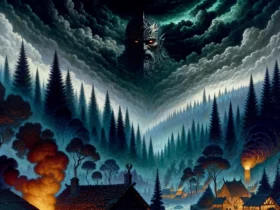
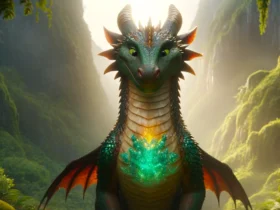
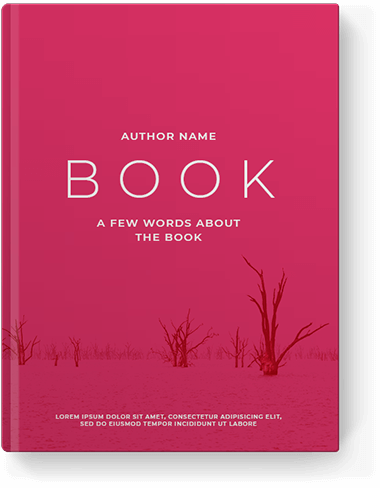
Leave a Reply